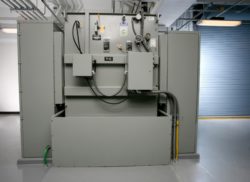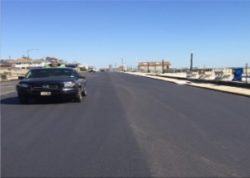Cutting Water, Pollution and Maintenance Costs at the World’s Largest Children’s Museum

Photo credit: Dave Rust, TCM Indy
Spring 2018 features the grand opening of the 7.5 acre Riley Children’s Health Sports Legends Experience at The Children’s Museum of Indianapolis. The world’s largest children’s museum’s new immersive learning experience allows children and their families to learn as they participate in sports activities inspired by some of history’s greatest athletes.
Sustainability supports all this activity while it saves water and pollution. About 18 tons of soy-backed, technologically advanced artificial turf made by SYNLawn anchors more than 60,000 square feet of the miniaturized world-famous golf greens as well as football, baseball and soccer mini fields. SYNLawn’s EnviroLoc™ backing replaces up to 60 percent of petroleum-based polymers with biobased materials, including soybean oil. The grass is 100 % recyclable, made in America and conserves water.
Water saved: Approximately 840,000 gallons (equaling 46 average-sized swimming pools) of water will be saved each year by using biobased SYNLawn vs natural grass.
Pollution averted: the equivalency of 168 hours of car exhaust won’t get released into the atmosphere since environmentally-friendly SYNLawn requires no mowing.
Tons of Turf: The eight types of SYNLawn turf covering the 18 miniaturized world-famous replica golf holes, nine introductory golf holes and nine toddler holes weight 11.8 tons (23K+ pounds) and SYNLawn turf from the combined football, soccer and baseball mini-fields weigh 6.3 tons (12K+ pounds)
For more information, go to Synlawn.com
Biobased, Natural Ester Transformer Oil Reduces Operating Costs, Increases Reliability

Photo credit: Cargill
Envirotemp FR3 fluid is a natural ester derived from renewable vegetable oils – providing improved fire safety, transformer life/loadability, and environmental benefits that are superior to mineral oil. Available on the market for 20 years, natural esters are used in both power and distribution transformers for indoor and outdoor applications. They are known as a K-class (300°C), readily biodegradable fluid that helps improve fire safety and the environmental footprint. What many people don’t know is that natural esters are a great alternative to dry-type indoor applications. Dry-type transformers are often specified for indoor applications to reduce fire risk and maintenance as they do not contain a fluid.
The choice makes sense if the transformer is filled with mineral oil as it has a 160°C fire point and often has to be reprocessed. However, natural esters have a 360°C fire point so the risk of fire is greatly reduced and the fluid does not need to be reprocessed.
Natural ester-filled indoor units offer many benefits over dry-type units including:
• More energy efficient (reduced total losses)
• Smaller footprint (no cooling equipment required)
• Quieter (equivalent sized dry-type unit is twice as loud)
• Up to 20% more load capacity (can better handle peak demand and overload situations)
• Reduce costs
◦ Over a five-year period, could save more than $9,000 in losses for each 500k (Volt Amps) VA and more than $28,000 for each 2500kVA natural ester-filled transformer
◦ Given the potential noise factor, a dry-type unit may require additional sound mitigation measures and increased space between transformer and occupied areas, which could increase the per-foot cost.
◦ Reduce cost/(Kilo Volt Amps)KVA with a lower-rated natural ester-filled transformer that can handle short-term peak demand or overload versus having to install a larger sized dry-type unit
These benefits add up to using less energy, less space and less raw materials while increasing the fire and environmental safety for many utilities, commercial and industrial organizations.
Cargill’s FR3™ natural ester fluid has more than 2 million installations worldwide and is used in a variety of applications, such as data centers, substations, wind, hydro and solar in both power and distribution transformers. It is part of the BioPreferred Program, and EPA awarded it with the Presidential Green Chemistry Award in 2013.
For more information, go to envirotempfluids.com
Save $7.92 Cents-a-Yard–Skip Double-Stick Method with Soy-biobased Carpet

Signature Carpet utilizes biobased backing in senior care facility installation. Photo credit: Signature Hospitality Carpets.
Sustainability and cost effectiveness go together with BioCel™ polyurethane carpet backing on Signature Carpets. See the numbers in this presentation to learn more about how to save money with the direct glue method of installation. With increased performance and installation savings, using BioCel™ significantly cut costs as seen in the following 1815-square yard installation:
Total Savings: $7.92 sq. yd. x 1815 sq. yds. = $14,374.80
1815 sq. yds. ColorPoint w/ Double Stick Installation
- Material Cost: $26.49
- Cushion: $7.65
- Pad Installation: $4.77
- Carpet Installation: $5.00
- Total: $43.91 sq. yd.
1815 sq. yds. ColorPoint w/ BioCel Cushion
- Material Cost: $30.99
- Carpet Installation: $5.00
- Total: $35.99 sq. yd.
MORE DETAILS AVAILABLE AT THIS POWERPOINT
BioCel™ replaces more than 90 percent of petroleum-based polymers with biobased polymers made with U.S. soybean oil. With improved tuft bind and edge ravel properties, the low-VOC backing adds value by increasing appearance retention and holding its lamination strength. In addition to using rapidly renewable U.S. soybean oil, this fully recyclable solution doubles down on sustainability by including four recycled plastic bottles per square foot of carpeting.
Fore more information, go to SignatureHospitalityCarpets.com
Increasing Recycled Asphalt Content with Cargill’s Biobased Anova™ Rejuvenator Delivers a More Cost-effective, Better-Performing Road

Photo credit: Cargill
Asphalt is one of the most renewable sources of recycled materials. Many roads that are resurfaced use some amount of recycled content. However to date, the amount used is limited because the existing asphalt is aged and has lost many of its original performance characteristics.
By incorporating Cargill’s Anova™ bio-based rejuvenator, the aged asphalt properties are restored, enabling pavers to significantly increase their recycled content from say 20% to 40%, even up to 100% without sacrificing performance such as cracking and rutting resistance. Further, by reducing the amount of virgin aggregate and bitumen, projects can be more cost-effective for the end-user and the paving contractor.
In this example, the left side of the road was paved using high recycled content and Anova™ rejuvenator. The right side was untreated and paved using low-recycled content. The result is a blacker road that also meets the project’s stringent performance specifications.
Performance aside, increasing recycled content makes a significant sustainability impact on the value chain. For example, increasing recycled content 20% on a typical 5,000 ton project can save:
• 48 trucks of virgin aggregate
• 1,000 tons of recycled asphalt storage and landfill costs
• 2 trucks of liquid asphalt
• Carbon emissions
For more information, go to Cargill.com/anova-asphalt.
